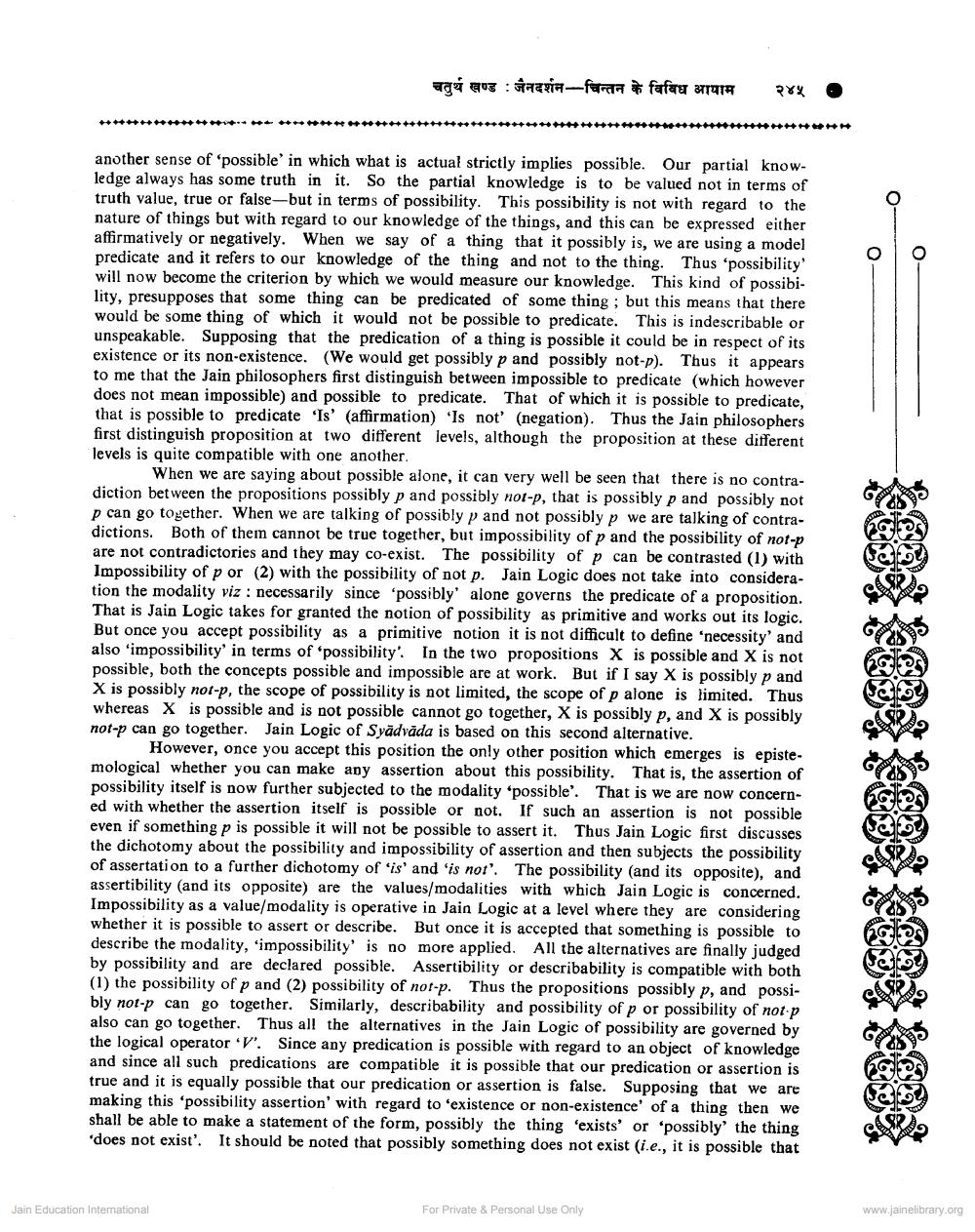________________
चतुर्थ खण्ड : जैनदर्शन - चिन्तन के विविध आयाम २४५
another sense of 'possible' in which what is actual strictly implies possible. Our partial knowledge always has some truth in it. So the partial knowledge is to be valued not in terms of truth value, true or false-but in terms of possibility. This possibility is not with regard to the nature of things but with regard to our knowledge of the things, and this can be expressed either affirmatively or negatively. When we say of a thing that it possibly is, we are using a model predicate and it refers to our knowledge of the thing and not to the thing. Thus 'possibility' will now become the criterion by which we would measure our knowledge. This kind of possibility, presupposes that some thing can be predicated of some thing; but this means that there would be some thing of which it would not be possible to predicate. This is indescribable or unspeakable. Supposing that the predication of a thing is possible it could be in respect of its existence or its non-existence. (We would get possibly p and possibly not-p). Thus it appears to me that the Jain philosophers first distinguish between impossible to predicate (which however does not mean impossible) and possible to predicate. That of which it is possible to predicate, that is possible to predicate 'Is' (affirmation) 'Is not' (negation). Thus the Jain philosophers first distinguish proposition at two different levels, although the proposition at these different levels is quite compatible with one another.
When we are saying about possible alone, it can very well be seen that there is no contradiction between the propositions possibly p and possibly not-p, that is possibly p and possibly not p can go together. When we are talking of possibly p and not possibly p we are talking of contradictions. Both of them cannot be true together, but impossibility of p and the possibility of not-p are not contradictories and they may co-exist. The possibility of p can be contrasted (1) with Impossibility of p or (2) with the possibility of not p. Jain Logic does not take into consideration the modality viz: necessarily since 'possibly' alone governs the predicate of a proposition. That is Jain Logic takes for granted the notion of possibility as primitive and works out its logic. But once you accept possibility as a primitive notion it is not difficult to define 'necessity' and also 'impossibility' in terms of 'possibility'. In the two propositions X is possible and X is not possible, both the concepts possible and impossible are at work. But if I say X is possibly p and X is possibly not-p, the scope of possibility is not limited, the scope of p alone is limited. Thus whereas X is possible and is not possible cannot go together, X is possibly p, and X is possibly not-p can go together. Jain Logic of Syadvada is based on this second alternative.
However, once you accept this position the only other position which emerges is epistemological whether you can make any assertion about this possibility. That is, the assertion of possibility itself is now further subjected to the modality 'possible'. That is we are now concerned with whether the assertion itself is possible or not. If such an assertion is not possible even if something p is possible it will not be possible to assert it. Thus Jain Logic first discusses the dichotomy about the possibility and impossibility of assertion and then subjects the possibility of assertation to a further dichotomy of 'is' and 'is not'. The possibility (and its opposite), and assertibility (and its opposite) are the values/modalities with which Jain Logic is concerned. Impossibility as a value/modality is operative in Jain Logic at a level where they are considering whether it is possible to assert or describe. But once it is accepted that something is possible to describe the modality, 'impossibility' is no more applied. All the alternatives are finally judged by possibility and are declared possible. Assertibility or describability is compatible with both (1) the possibility of p and (2) possibility of not-p. Thus the propositions possibly p, and possibly not-p can go together. Similarly, describability and possibility of p or possibility of not p also can go together. Thus all the alternatives in the Jain Logic of possibility are governed by the logical operator V. Since any predication is possible with regard to an object of knowledge and since all such predications are compatible it is possible that our predication or assertion is true and it is equally possible that our predication or assertion is false. Supposing that we are making this 'possibility assertion' with regard to 'existence or non-existence' of a thing then we shall be able to make a statement of the form, possibly the thing 'exists' or 'possibly' the thing 'does not exist'. It should be noted that possibly something does not exist (i.e., it is possible that
Jain Education International
For Private & Personal Use Only
www.jainelibrary.org




